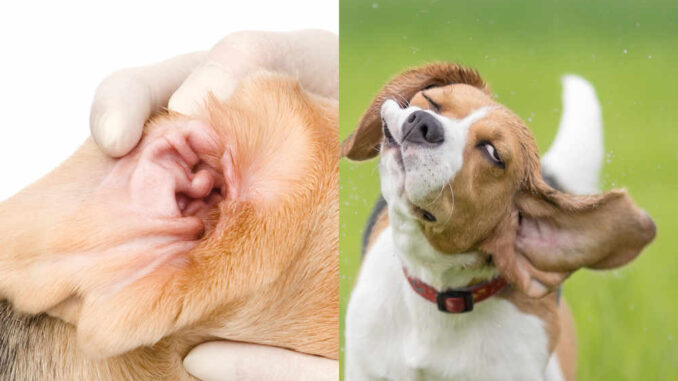
It’s common for dogs to normally shake their heads and flap their ears, especially after swimming, baths, when they’re excited, or even after waking up from a good nap. If your dog is shaking their head multiple times a day (3+ times in a day), it’s important to look in their ears for anything unusual. If you notice a lot of black or brown debris in the ear, it’s very likely your dog has an ear infection. However, there may be some instances when your dog shakes their head, but their ears look clean. In this article, we will review the most likely causes of head shaking (despite clean ears), and what you can do to help your dog.
What if my dog’s ears are clean?
There are many possible reasons for ear irritation when your dog’s ears look clean. A basic understanding of dog ear anatomy and these causes are helpful when trying to determine the best action to relieve your dog’s discomfort.
When inspecting your dog’s ears at home, it’s important to realize that you cannot see the entirety of their ear canal like your veterinarian can with the proper medical equipment. The dog ear canal has two sections: the vertical canal and the horizontal canal.
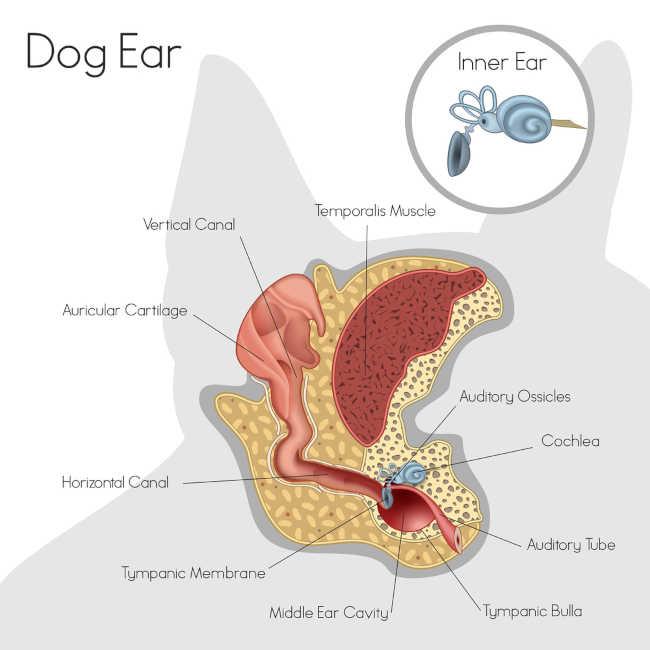
When you look at your dog’s ear at home, you can only see the vertical canal. The ear canal then turns and becomes the horizontal canal, eventually ending at the eardrum. Your veterinarian can properly assess the horizontal canal during a physical exam. As a result, it’s important to remember that your dog’s ears may look clean from the outside, but there may be debris or other abnormalities you cannot see deeper down.
Top causes of head shaking in dogs when ears are clean
1. Bacterial and yeast ear infections
Signs that your dog has an ear infection include:
- Dogs with bacterial or yeast ear infections usually shake their head excessively and scratch at one or both of their ears.
- Ears are typically red on the inside and may have a foul odor.
- Most dog ear infections produce black or brown debris, but sometimes the ears can look clean to the naked eye. Debris may be present further down in the ear canal, or the infection could still be mild.
Some dogs are extremely sensitive to yeast infections and will be uncomfortable with even a mild infection that doesn’t produce much discharge.
How to treat bacterial or yeast ear infections: Cleaning the ears with a high-quality dog ear cleaning solution at home can help prevent bacterial or yeast ear infections, but this is usually not effective enough to treat ears that are already infected. If you suspect your dog has an ear infection, make an appointment with your vet, who will perform an ear cytology to determine if an infection is present, and prescribe an antibiotic or antifungal ear medication to treat the infection. Most bacterial or yeast infections resolve with treatment within two weeks. Learn more about ear infections in dogs.
2. Allergies causing itchy ears
Allergies are a widespread problem in dogs that can manifest as:
- excessive scratching or licking anywhere on the body, including ears
- skin infections with scabs and bumps and/or hair loss.
- Itchy ears, causing your dog to shake their head or scratch at their ears.
Allergies can cause bacterial or yeast infections in the ears, but they can also cause the ears to itch without causing infection. In this case, the ears will look clean but may be a little red.
Depending on the dog, allergies can be easy or more challenging to manage. Numerous things, including fleas, food allergens, or environmental allergens such as grasses, trees, mold, and dust, can cause allergies. If you suspect your dog has allergies, discuss options with your veterinarian to get your dog relief. Treatment options include over-the-counter antihistamines, changing diets, or prescription allergy medications. Studies have shown that skin support supplements such as omega-3 fatty acids may also help relieve itchy ears related to allergies. Cleaning your dog’s ears with a high-quality soothing dog ear cleaning solution can also manage itchy ears. Learn more with our article featuring pictures of skin allergies in dogs (with veterinarian advice).
3. Middle ear infections
Middle ear infections, referred to as “otitis media” by veterinary professionals, can cause significant pain and discomfort for your dog. The ear canal often looks clean with a middle ear infection. You may notice:
- head shaking and scratching at the ear,
- head tilt,
- unsteadiness on the feet or “wobbliness,” and
- erratic eye movements.
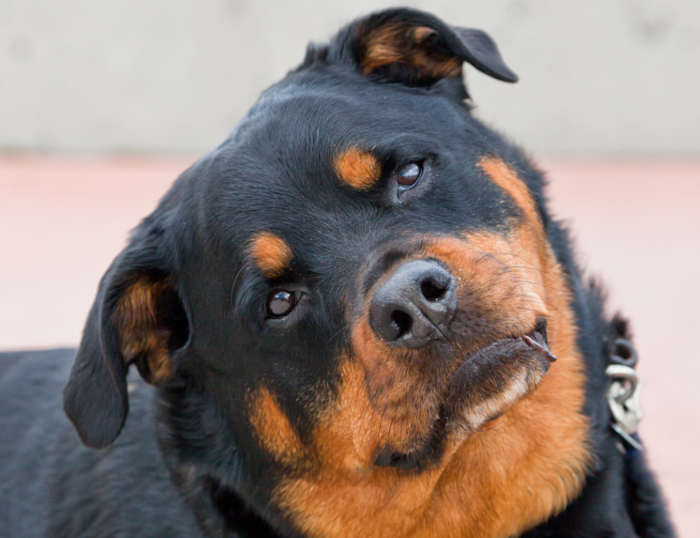
To determine if your dog has a middle ear infection, your veterinarian will look at the eardrum for any tears, discoloration, or bulging. Middle ear infections are usually treated with antibiotics and pain medication.
4. Water in the ear
Did your dog just go in the water? Because of the long and angled shape of the dog’s ear canal, it is easy for water to get trapped deep in your dog’s ear. After bathing or swimming, your dog may feel the water in their ear and shake their head excessively to try to get it out.
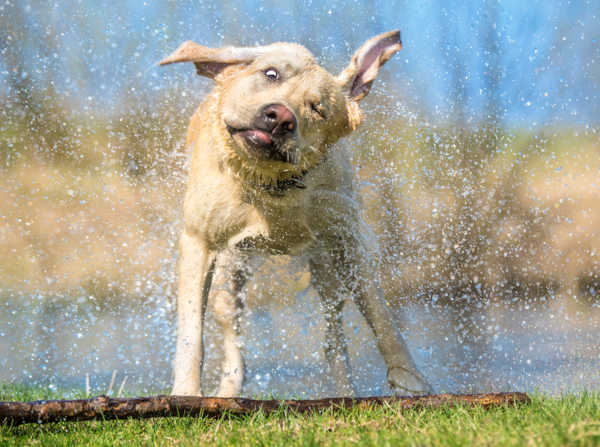
Water stuck in the ear canal can lead to bacterial or yeast infections. To avoid the discomfort of having water trapped in the ear and subsequent infections, you can flush your dog’s ears out with an ear cleaner recommended by your veterinarian after swimming or baths. View our recommended dog ear cleaners or watch this video on how to clean a dog’s ear:
5. Foreign objects stuck in the ear canal
Sometimes, foreign objects may get lodged in the ear canal and cause your dog to shake their head from the discomfort. The ear canal will likely look clean unless the object has been stuck for multiple days or weeks.
If you can visualize the foreign object, you can carefully remove it with tweezers with blunt ends (to avoid piercing the ear canal with a sharp edge). If you cannot remove it or visualize the foreign object, take your dog to the vet. Your vet will likely sedate your dog, flush the object out with saline, or remove it with special instruments.
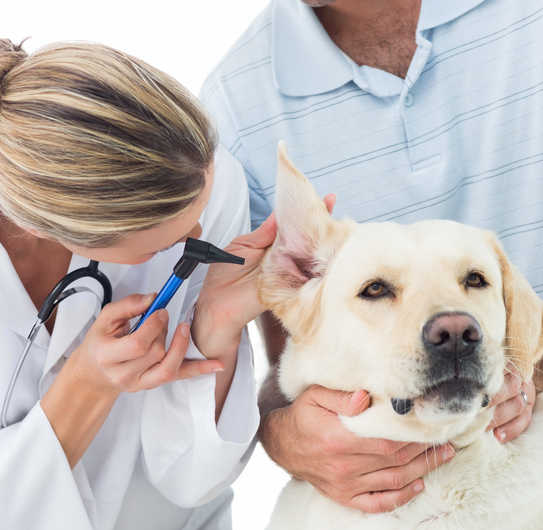
6. Tumors in the ear canal
Unfortunately, dogs can develop cancerous growths in their ear canals. Ear tumors can cause discomfort leading to head shaking or scratching at the ear, but the ear canal may look clean.
You may be able to see a tumor by looking in your dog’s ear canal at home, but sometimes a complete ear exam by a veterinarian is needed. Occasionally, specialized equipment such as a CT scan is necessary to diagnose an ear tumor.
Treatment for ear tumors depends on many factors- whether the tumor is benign or malignant, the location of it in the ear canal, and how large it is. Your veterinarian may recommend surgery or chemotherapy to treat and remove the tumor. If the tumor is small and benign, monitoring it at home can also be a reasonable option.
7. Ear Mites
Ear mites are uncommon in dogs and usually produce a lot of black “coffee ground” like discharge. As a result, it is very unlikely that ear mites would cause head shaking in a dog with clean ears. Your veterinarian can quickly diagnose ear mites by microscopic examination of swabs taken from the ear canal. Ear mites are usually easily treated with commonly used oral flea and tick medications (i.e. Nexgard, SImparica) or topical medications like Revolution.
Is there anything I can do at home to help my dog?
If your dog is frequently shaking their head at home, you can take the following steps:
- Watch your dog to see if they are also scratching at the ears, as this is more common with bacterial or yeast ear infections and allergies. Also, determine if the problem seems to be one or both ears.
- Examine the ears for redness, a bad smell, or debris/discharge
- Clean the ears with an ear cleaner recommended by your veterinarian once daily or every other day for 4-5 days.
- If the head shaking is not improving or is worsening, make an appointment with your veterinarian.
When should I be concerned about my dog’s head shaking? (if their ears appear clean)
Head shaking with clean ears is concerning when your dog:
- Is shaking their head more than 3-4 times per day
- Seems painful or guarded when you touch or approach the ear
- Has a poor or decreased appetite
- Seems lethargic or just not quite themselves
- Is tilting their head abnormally
- Seems unsteady on their feet or cannot balance properly
Make an appointment with your veterinarian if you notice any of these concerning signs or if you have tried cleaning the ears at home and the head shaking has not improved.
Will the head shake resolve by itself if my dog’s ears are clean?
Head shaking sometimes resolves by itself. If water is trapped in the ear and your dog can get it out, or if the ears are feeling itchy from allergies and the allergy symptoms get better, the head shaking may go away without treatment. However, ear infections in the outer or middle ear or tumors do not generally resolve without intervention – and may get worse over time.
If you are unsure of the cause of the head shaking, it’s best to make an appointment with your vet. In some cases, if the cause of head shaking goes untreated, your dog’s discomfort can worsen.
Learn more on Senior Tail Waggers:
9 Best Dog Ear Cleaning Solutions, According to a Vet
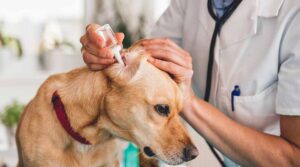
Preventing ear infections in dogs
If your dog is susceptible to ear infections, there are a couple of things you can do at home to try to prevent them.
- Clean the ears with an ear cleaner recommended by your veterinarian once to twice weekly.
- Control allergies with a special diet, supplements, or medications. Allergies are one of the most common reasons for itchy ears and ear infections, so if your dog’s allergies are well-controlled, this will usually prevent ear infections
Frequently asked questions
Why is my dog shaking his head only at night?
Allergies and ear mites are two causes of head shaking that can be more uncomfortable in the evening. However, any cause of head shaking is still possible.
Why is my senior dog shaking his head?
The causes of head shaking in senior dogs are not significantly different than younger dogs, but senior dogs do have a higher incidence of tumors and middle ear infections compared to younger dogs.
Do all dogs need to have their ears cleaned?
No, some dogs do not require ear cleaning. Dogs prone to ear infections or swim frequently should have their ears cleaned routinely.
Learn more:
5 Most Common Dog Ear Infections [with images] & What To Do
Disclaimer: This website's content is not a substitute for veterinary care. Always consult with your veterinarian for healthcare decisions. Read More.


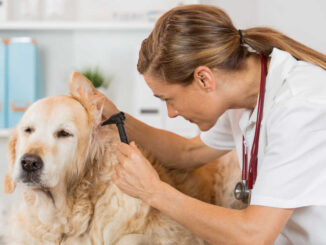
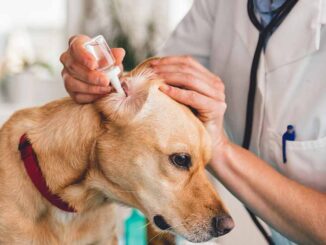
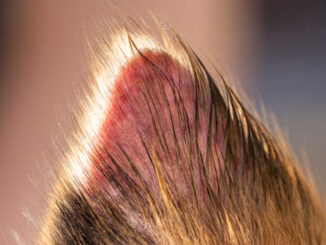
Be the first to comment